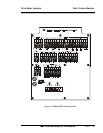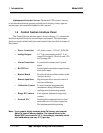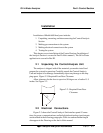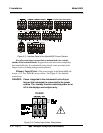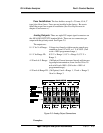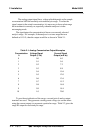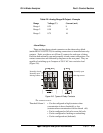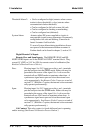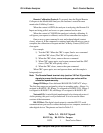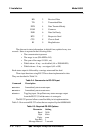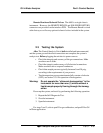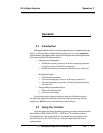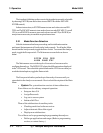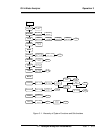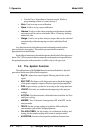
Oil in Water Analyzer Part I: Control Section
Part I: 2-7
Teledyne Analytical Instruments
Remote Calibration Protocol: To properly time the Digital Remote
Cal Inputs to the Model 6600 Analyzer, the customer's controller must
monitor the Cal Relay Contact.
When the contact is OPEN, the analyzer is analyzing, the Remote Cal
Inputs are being polled, and a zero or span command can be sent.
When the contact is CLOSED, the analyzer is already calibrating. It
will ignore your request to calibrate, and it will not remember that request.
Once a zero or span command is sent, and acknowledged (contact
closes), release it. If the command is continued until after the zero or span is
complete, the calibration will repeat and the Cal Relay Contact (CRC) will
close again.
For example:
1) Test the CRC. When the CRC is open, Send a zero command
until the CRC closes (The CRC will quickly close.)
2) When the CRC closes, remove the zero command.
3) When CRC opens again, send a span command until the CRC
closes. (The CRC will quickly close.)
4) When the CRC closes, remove the span command.
When CRC opens again, zero and span are done, and the sample is
being analyzed.
Note: The Remote Bench terminal strip (section 3.6 Part III) provides
signals to ensure that the zero and span gas valves will be
controlled synchronously.
Range ID Relays: Four dedicated RANGE ID CONTACT relays .
The first four ranges are assigned to relays in ascending order—Range 1 is
assigned to RANGE 1 ID, Range 2 is assigned to RANGE 2 ID, Range 3
is assigned to RANGE 3 ID, and Range 4 is assigned to RANGE 4 ID.
Network I/O: A serial digital input/output for local network protocol.
At this printing, this port is not yet functional. It is to be used in future
versions of the instrument.
RS-232 Port: The digital signal output is a standard RS-232 serial
communications port used to connect the analyzer to a computer, terminal, or
other digital device. The pinouts are listed in Table 2-3.
Table 2-3: RS-232 Signals
RS-232 Sig RS-232 Pin Purpose
DCD 1 Data Carrier Detect



